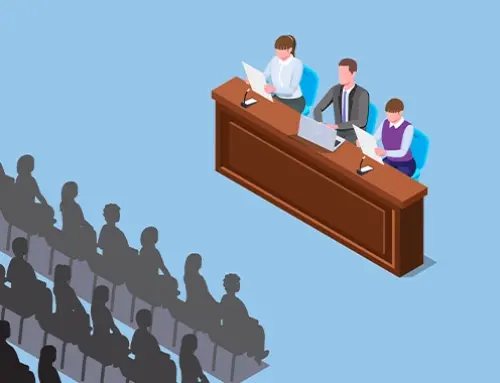Contents
Introduction
In the dynamic world of law, the role of a paralegal is indispensable. Law firms seeking to enhance their operational efficiency and case management must focus on hiring skilled paralegals. This begins with asking the right paralegal interview questions. The ability to select a qualified paralegal not only streamlines workflow but also significantly impacts the firm’s success. Understanding the pivotal questions to ask during an interview can lead to better hiring decisions and, ultimately, a more proficient legal team.
The quality of questions posed during the interview process is critical. They should not only probe the candidate’s qualifications and experience but also their problem-solving abilities, ethical standards, and cultural fit within your firm. The right questions can reveal much more than what is on a resume; they can spotlight a candidate’s practical competence and their potential to grow along with your firm. Thus, starting the interview with a strategic set of questions is key to hiring not just a competent paralegal, but the right paralegal for your firm’s specific needs.
By asking comprehensive and thoughtfully designed paralegal interview questions, firms can gain deep insights into the capabilities and personality of each candidate, ensuring a more targeted and effective recruitment process.
Question 1: What Are Your Educational Qualifications?
Understanding the Paralegal’s Academic Background
The academic qualifications of a paralegal provide a foundation of their legal knowledge. Inquiring about their education, including degrees and specialized training, helps assess their theoretical grasp of the law. Knowing whether they possess a degree in paralegal studies or have taken substantial coursework in legal topics is essential. This question also allows interviewers to gauge the depth of the candidate’s commitment to the legal field, which can be a good indicator of their long-term potential at your firm.
The Value of Different Paralegal Certifications
Beyond formal education, paralegal certifications can significantly enhance a candidate’s appeal. Certifications such as the Certified Paralegal (CP) or Advanced Paralegal Certification (APC) demonstrate a professional commitment to the legal profession and a mastery of specialized skills that are invaluable in a law office setting. These credentials show that the candidate is not only knowledgeable but also committed to maintaining a high standard of professionalism and ethics. Asking about certifications allows you to understand their readiness to handle the complex tasks and challenges they will face in your firm.
By evaluating both educational background and certifications, you can better determine the candidate’s preparedness and fit for your legal team, ensuring that your firm is hiring a well-rounded paralegal who can contribute significantly from day one.
Question 2: What Areas of Law Do You Have Experience In?
How Practice Areas Can Affect a Paralegal’s Competence
Experience in specific areas of law is pivotal in determining how well a paralegal can perform in your firm’s particular legal environment. Each area of law, whether it be family law, criminal defense, intellectual property, or corporate law, requires a unique set of skills and knowledge. By understanding the types of legal environments, a candidate has previously navigated, you can assess their competence and adaptability. This question not only reveals their expertise in relevant legal domains but also their ability to handle the nuances and complexities specific to different legal practices.
Matching Paralegals to Your Firm’s Needs
The alignment of a paralegal’s expertise with your firm’s areas of practice is crucial for efficient case management. For example, a paralegal experienced in patent law would be particularly valuable in a firm specializing in intellectual property. Conversely, a background in family law might be less applicable. This question helps ensure that the paralegal’s skills and experiences are directly applicable to the types of cases your firm typically handles, optimizing both their potential impact and your firm’s productivity.
Understanding a candidate’s background in specific legal areas helps tailor the interview process to probe deeper into relevant experiences, ensuring a fit that benefits both the candidate and the firm.
Question 3: Describe a Challenging Case You’ve Worked On.
Analyzing Problem-Solving Skills
When a paralegal recounts a challenging case they have handled, it provides invaluable insights into their problem-solving capabilities. This question allows you to delve into how they approach complex legal issues, strategize solutions, and navigate the obstacles that inevitably arise during legal proceedings. Their response can illustrate not only their legal acumen but also their creativity and perseverance in overcoming challenges.
Gauging the Ability to Work Under Pressure
The nature of a paralegal’s role often requires managing high-stress situations effectively. How they describe their handling of a challenging case can also shed light on their ability to maintain composure and clarity under pressure. It is important to hear how they prioritize tasks, collaborate with others, and utilize resources, including RunSensible’s legal case management software, to manage their responsibilities efficiently. This question helps determine if the candidate possesses the resilience and strategic thinking necessary to thrive in a demanding legal environment
By assessing a candidate’s experience with difficult cases, you gain a clearer picture of their practical skills and psychological readiness, ensuring they are well-equipped to handle the pressures and complexities of your firm’s caseload.
Question 4: How Do You Prioritize and Organize Your Work?
Time Management Skills
Effective time management is crucial for a paralegal, who must often juggle multiple cases and deadlines simultaneously. This question helps gauge a candidate’s ability to organize their workload and prioritize tasks efficiently. Understanding their methods for scheduling, task triage, and deadline management can provide insights into their operational effectiveness and reliability. These skills are essential for maintaining the flow of work and ensuring that no details are overlooked in the fast-paced legal environment.
More details about time management can be found here.
Software and Tools for Managing Cases
In addition to traditional organizational skills, familiarity with modern legal technologies, such as legal case management software, is increasingly important. For instance, RunSensible’s legal case management software offers tools that streamline case tracking, document management, and client communication. By asking about the software and tools the candidate is accustomed to using, you can assess their technological adeptness and readiness to integrate into your firm’s workflow. This can significantly reduce onboarding time and enhance overall efficiency.
This discussion around prioritization and organizational tools is not just about finding someone who can manage their workload but finding a paralegal who can enhance the productivity of your entire team with their skills and tools.
Question 5: How Do You Handle Confidential Information?
Understanding Data Security Awareness
Handling confidential information is a fundamental aspect of a paralegal’s role. This question is crucial as it explores the candidate’s awareness and practices regarding data security. It is important to understand how they have previously managed sensitive information, whether through physical file security or digital data protection methods. Their response can reveal their knowledge of confidentiality protocols and their commitment to safeguarding client information—a core responsibility in any legal setting.
Compliance with Legal and Ethical Standards
Compliance with legal and ethical standards is another critical element that this question addresses. It allows you to assess the candidate’s familiarity with relevant laws and regulations, such as the General Data Protection Regulation (GDPR) or other local legal frameworks, depending on your jurisdiction. This not only includes their ability to adhere to legal requirements but also their ethical judgment in handling sensitive situations. The integrity and professionalism shown in maintaining confidentiality are strong indicators of a paralegal’s suitability for your firm.
This inquiry ensures that the paralegal you choose is not only capable of managing the day-to-day tasks but also deeply understands and respects the importance of privacy and ethical considerations in the legal profession.
Question 6: How Do You Keep Up with Changes in the Legal Field?
Continuing Education and Professional Development
The legal field is constantly evolving, and staying abreast of these changes is essential for any paralegal. This question helps evaluate a candidate’s commitment to their ongoing professional development. Are they taking courses, attending seminars, or engaging in other educational activities to enhance their legal knowledge? This willingness to continue learning not only keeps them updated with the latest legal trends and regulations but also demonstrates a proactive attitude toward their career development.
Staying Updated with Legal Software and Tools
In addition to traditional forms of education, the use of advanced legal software and tools plays a significant role in a paralegal’s ability to perform efficiently. Familiarity with the latest technologies, such as RunSensible’s legal case management and CRM software, can dramatically increase a paralegal’s productivity. This part of the discussion helps identify if the candidate is technologically adept and comfortable adapting to new tools that can facilitate case management, client communications, and overall firm operations.
This question underscores the importance of adaptability and continuous learning in maintaining high standards of legal service. A candidate who is committed to both personal growth and technological adaptability is more likely to contribute effectively to your firm’s success.
To learn more, click here.
Question 7: How Do You Manage Relationships with Clients and Colleagues?
Communication Skills and Conflict Resolution
Effective communication is the cornerstone of a successful paralegal’s career. This question delves into how the candidate interacts with clients and colleagues, highlighting their ability to convey information clearly and professionally. Understanding their strategies for dealing with conflicts—whether with a client over case details or within the team over workflow issues—can provide critical insights into their interpersonal skills and suitability for a collaborative work environment.
Working in a Team Environment
The dynamics of a legal team often require a high degree of collaboration and coordination. This part of the interview assesses the candidate’s experience and comfort level working within team settings. Are they able to support lawyers and other staff effectively? Can they handle the pressures of shared responsibilities and deadlines? Their responses can reveal much about their personality, work ethic, and potential fit within your team’s culture.
Evaluating a candidate’s communication skills and their ability to function in a team are crucial for ensuring that new hires will enhance the firm’s operational harmony and contribute positively to client satisfaction.
Question 8: How Do You Handle Tight Deadlines and Multiple Cases?
Stress Management Techniques
Handling tight deadlines and managing multiple cases simultaneously are common challenges in the legal field. This question explores the candidate’s stress management techniques and their approach to maintaining productivity under pressure. Understanding how they prioritize tasks, delegate when necessary, and utilize time management strategies can reveal their capability to operate efficiently during peak workload periods.
Balancing Workload Efficiently
The ability to balance a heavy workload is crucial for a paralegal. This part of the interview assesses how the candidate organizes their tasks and ensures that each case receives the attention it requires. Do they use specific tools or systems to track their progress? Are they proactive in communicating status updates to ensure transparency with the team? Their answers can provide a clear picture of their operational style and effectiveness in a high-pressure environment.
By examining how a paralegal handles tight deadlines and multiple cases, you can gauge their potential to contribute to your firm’s productivity and client satisfaction effectively.
Question 9: Why Are You Interested in Working for Our Firm?
Assessing Their Motivation and Fit for the Firm
This question is vital for understanding the candidate’s personal and professional reasons for applying to your firm. It reveals what they know about your firm’s practices, culture, and values, and shows their genuine interest—or lack thereof. Are they attracted by your firm’s reputation, the type of cases you handle, or the professional development opportunities you offer? Their response can give you insights into their career aspirations and how these align with the goals of your firm.
Aligning Goals and Values
The alignment of a candidate’s personal goals with the values and objectives of your firm is crucial for long-term success. This inquiry helps determine if they see a future with your firm and if they are likely to be a committed, motivated member of your team. Understanding their professional goals and how they relate to the offerings and ethos of your firm can help predict their potential engagement and retention.
Evaluating why candidates are interested in your firm not only helps in selecting the most motivated individuals but also ensures that new hires are more likely to integrate well into your team and contribute positively to the firm’s culture and success.
Question 10: How Do You Stay Motivated and Productive?
Intrinsic and Extrinsic Motivation Factors
This question is crucial for understanding what drives a paralegal to perform at their best. Motivation can come from various sources, both intrinsic (such as personal satisfaction and achievement) and extrinsic (such as rewards, recognition, and career advancement). By exploring these motivational factors, you can assess how the candidate maintains their productivity and enthusiasm for their work. This insight helps in understanding how they will handle the day-to-day challenges of the job and what support they might need to thrive in your firm.
Balancing Personal and Professional Life
The ability to balance personal and professional life significantly affects an employee’s long-term productivity and job satisfaction. This part of the interview provides a glimpse into how the candidate manages stress, replenishes their energy, and prevents burnout. It’s important to know if they have effective strategies for maintaining this balance, as it directly impacts their ability to contribute consistently and positively in a high-demand legal environment. Understanding a candidate’s motivational drivers and their approach to work-life balance is key to ensuring they have the stamina and enthusiasm to excel over the long term at your firm.
Conclusion:
Finding the right paralegal for your firm goes beyond assessing technical skills and experience; it involves understanding their ability to adapt, communicate, and grow within your organizational culture. Throughout the interview process, using detailed and insightful paralegal interview questions is crucial for uncovering not only the competencies but also the personal attributes that make a candidate a good fit for your firm.
The success of your firm depends significantly on the capabilities and fit of the individuals you choose to bring on board. A paralegal who is not only skilled but also aligns with your firm’s values and work ethic can dramatically enhance your team’s productivity and morale.
Incorporating tools like RunSensible’s legal case management software can further empower your paralegals to perform at their best. RunSensible offers features that streamline case management, client communications, and document handling, making it easier for your legal staff to stay organized and efficient. Encouraging candidates who are familiar with such technologies or are quick to adapt to them can lead to smoother operations and improved client satisfaction.
As you seek to hire the best talent for your law firm, consider how RunSensible can help you manage your cases and client relationships more effectively. Visit our website to learn more about our comprehensive legal software solutions and how they can transform your firm’s day-to-day operations.
FAQs:
1- What should I look for in a paralegal’s resume before an interview?
Look for specific educational qualifications, relevant certifications, detailed experience in diverse legal areas, and any mention of familiarity with legal software tools. These elements indicate a well-rounded candidate who is likely prepared to handle the responsibilities of a paralegal in a dynamic law firm environment.
2- How can I assess a paralegal candidate’s adaptability during an interview?
Ask about their experiences working with different legal professionals and in various legal settings. Questions about how they have handled unexpected changes or adapted to new technologies can also provide insights into their flexibility and ability to learn quickly.
3- What are the best practices for conducting a virtual paralegal interview?
Ensure both parties have a stable internet connection and use a reliable video conferencing tool. Prepare a list of questions that cover both technical skills and interpersonal abilities. Consider a virtual tour of your office to give the candidate a sense of the working environment and culture. Additionally, allow time for them to ask questions to gauge their interest and expectations.
4- How important is it for a paralegal to be familiar with legal software?
Very important. Familiarity with legal software such as case management systems, document management tools, and CRM platforms is essential for maintaining efficiency in modern law practices. During the interview, discuss the candidate’s experience with these technologies to understand their ability to integrate with your firm’s workflow effectively.
Disclaimer: The content provided on this blog is for informational purposes only and does not constitute legal, financial, or professional advice.








